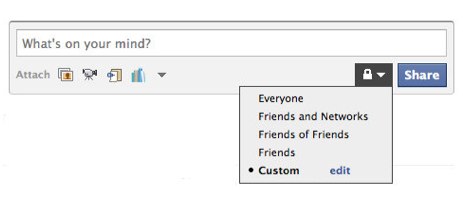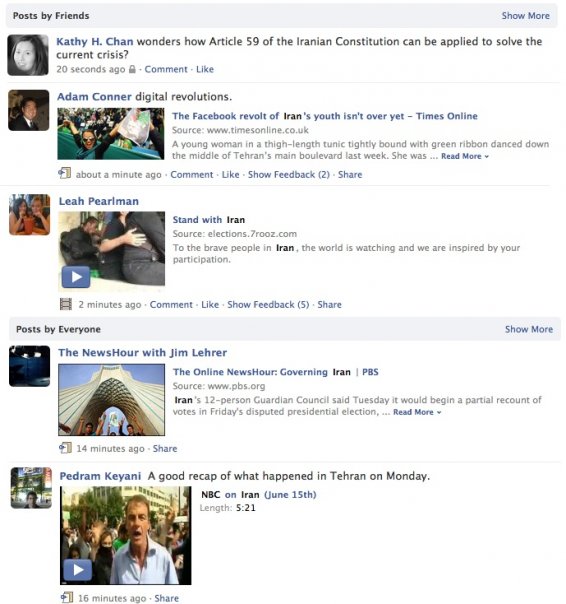 Facebook is hosting a webcast for press tomorrow about “upcoming privacy changes” to the site: the announcement will likely outline Facebook’s transition toward becoming more public – some might say more Twitter-like.
Facebook is hosting a webcast for press tomorrow about “upcoming privacy changes” to the site: the announcement will likely outline Facebook’s transition toward becoming more public – some might say more Twitter-like.
We already know change is on the way: last week Facebook announced that they’re beta testing a publishing feature (with a limited number of profiles) by which your Facebook status updates can optionally be made public. In short: you’ll be able to use Facebook just like Twitter, and broadcast public updates to the world.
We also wrote about another interesting find last week: a new setting in Facebook that lets you receive an email when someone becomes a “fan” of your Facebook profile – not a friend, but actually someone who follows your personal Facebook page without you reciprocating. And a new Facebook Search is in testing too, allowing you to search updates from friends or all public publishers.
Facebook, then, is moving to a model of public updates and Twitter-like followers. The question becomes: can Facebook, which built its brand on “real names” and true friendships, also become the leader in public sharing and updates?

The MySpace Era
 The tactic is certainly in contrast to Facebook’s early years: the network went beyond MySpace and its various clones by emphasizing real relationships and extreme privacy.
The tactic is certainly in contrast to Facebook’s early years: the network went beyond MySpace and its various clones by emphasizing real relationships and extreme privacy.
Your Facebook profile was a representation of your real-life social graph, and when users tired of amassing thousands of fake MySpace friends and adding “bling” to their profiles, they flocked to Facebook’s cleaner, more controlled environment with a smaller number of high-value relationships.
Facebook even limited networks of friends to 5000 people to prevent this high-volume friend adding, which threatened to devalue the meaning of a Facebook friend. The strategy served them well; MySpace became a ghost town.
Then Twitter happened…
…and suddenly the press was in love with openness again, with our newfound ability to mine the public consciousness through Twitter search, with a new era in which there was more value to be had in sharing information than in keeping it private.
Facebook’s gated community was a lot less useful when penning a news story about the Iranian elections, or the Hudson Plane Crash, or the public reaction to Michael Jackson’s death. Less useful, too, for conscientious brands looking for customer feedback. And less valuable for finding a new, spontaneous connection with that random Twitter user who happens to discuss the same topics as you.
Twitter’s public updates – and more specifically, the mining of these updates through Twitter Search – provided a more complete database of the public consciousness than ever before, a source of untold insights.

So what do you do when you’re all about privacy, and your upstart competitor is doing the complete opposite? By making a complete about-face, Facebook would lose the faith of its 200 million+ users who value the privacy of the site most of all: it’s what the core userbase was sold on from the start.
So Facebook is trying to find a middle road whereby privacy is maintained and public sharing is an optional extra. Over time, they surely hope, the number of Facebook “public” users will exceed the total number of Twitter users. At that point, Facebook would be a more valuable resource; it would become the larger hivemind.
Who will win the race is anybody’s guess: Twitter has a singular focus and the right DNA. It has a culture of public sharing that was present from the start. Facebook has scale on its side, and would only need to convert some of its users to public sharing to maintain its lead.
It’s a race that will define social networking for months and possibly years to come. And tomorrow Facebook will likely twannounce its next step.
-----
Vis Mashable
Personal comment:
Facebook vs Twitter vs Myspace: interesting strategies regarding "real time", privacy and networked status. We can definitely see where this all thing is going.
 Facebook is hosting a webcast for press tomorrow about “upcoming privacy changes” to the site: the announcement will likely outline Facebook’s transition toward becoming more public – some might say more Twitter-like.
Facebook is hosting a webcast for press tomorrow about “upcoming privacy changes” to the site: the announcement will likely outline Facebook’s transition toward becoming more public – some might say more Twitter-like.
 The tactic is certainly in contrast to Facebook’s early years: the network went beyond
The tactic is certainly in contrast to Facebook’s early years: the network went beyond 
